DOCTOR WHO – ‘The Power of The Doctor’
The Master brings the Daleks and Cybermen together to wipe the Doctor and Earth from existence.
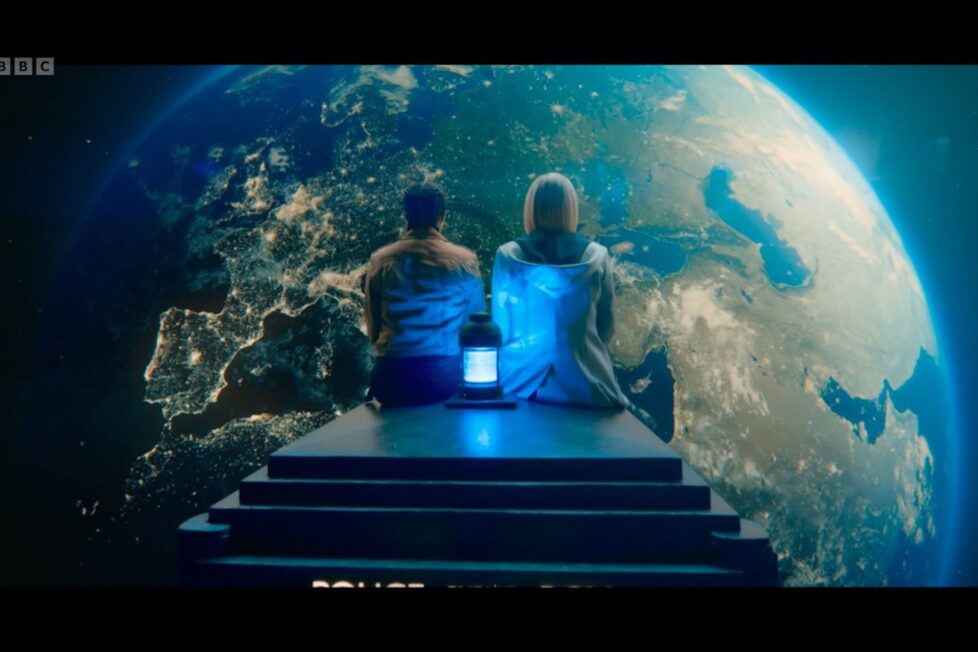
The Master brings the Daleks and Cybermen together to wipe the Doctor and Earth from existence.


There’s a line in “The Power of the Doctor” where The Doctor asks The Master, “do I win a prize if I guess how this all fits together?” Ironically, it describes a frustrating aspect of Chris Chibnall’s era of Doctor Who. Frustrating in the sense that—while he must be congratulated for his commitment to representation both on and off screen—the logic, consequences, and implications of his own stories are often abandoned. It’s fitting his era should be celebrated for its female Doctor (Jodie Whittaker), multi-ethnic companions Yaz (Mandip Gill) and Ryan (Tosin Cole), numerous non-white supporting actors (Lenny Henry, Jacob Anderson, Vinette Robinson, Jo Martin, Sacha Dhawan, etc) and, behind the camera, his hiring of such diverse writers and directors.
But despite this, his own scripts can be uneven. He tends to devise interesting story concepts (with a different take on The Doctor’s origins being a prime example), only to drive them into a cul-de-sac and leave them only partly unresolved. It’s a shame when the production values are the best they’ve ever been, and Whittaker makes for a compelling Doctor. “The Power of The Doctor” is no exception and is brilliantly performed by the cast and spectacularly handled by returning director Jamie Magnus Stone.
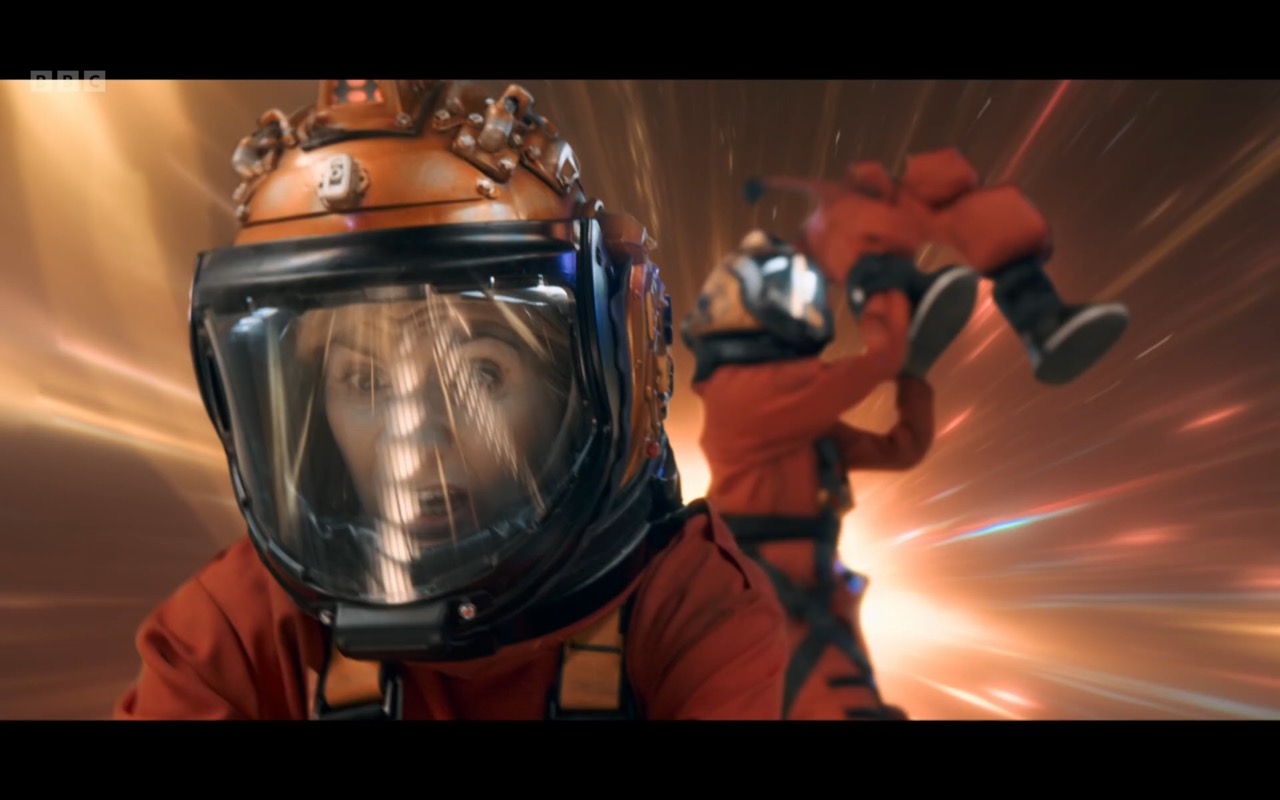
“The Power of The Doctor” bears all the hallmarks of a Chibnall script. The hanging narratives of 2020’s “The Timeless Children” and 2021’s “Survivors of the Flux”, with The Doctor’s past memories remaining buried in the bowels of the TARDIS and not referred to again, save for a welcome cameo from The Fugitive Doctor (Jo Martin). Rather, it’s a jigsaw of a plot where perhaps a lot of effort is spent trying to thump together slightly misaligned pieces as a swansong for Whittaker and a celebration of the BBC’s centenary. It works, just, and it’s the story’s fan service, often with indulgent homages to much of the classic era, the 1996 TV Movie, and the Russell T. Davies and Steven Moffat tenures, that actually glues some recalcitrant bits of plot, action, and spectacle together.
The pre-title opening, with The Doctor and her companions on a space train trying to stop the Cybermen from hijacking its cargo, with defeated Cybermen floating off into space suggesting a call back to the classic 1967 story “The Moonbase”, unexpectedly concludes with Dan (John Bishop) packing his companion bags after a near-death experience. Dan’s conclusion that, with The Doctor’s help, he’s now able to tackle his imperfect life is one similarly drawn by previous companions. The Doctor supposedly makes people better, but returning companion and former air hostess Tegan Jovanka (Janet Fielding) might have a few things to say about that! Perhaps including a subplot for Dan wasn’t sustainable in such a packed script, where the multi-layered plot is determined by returning villains and companions and structured by Chibnall’s familiar title card switches, between the locales of Siberia and St Petersburg in 1916 and present-day London.
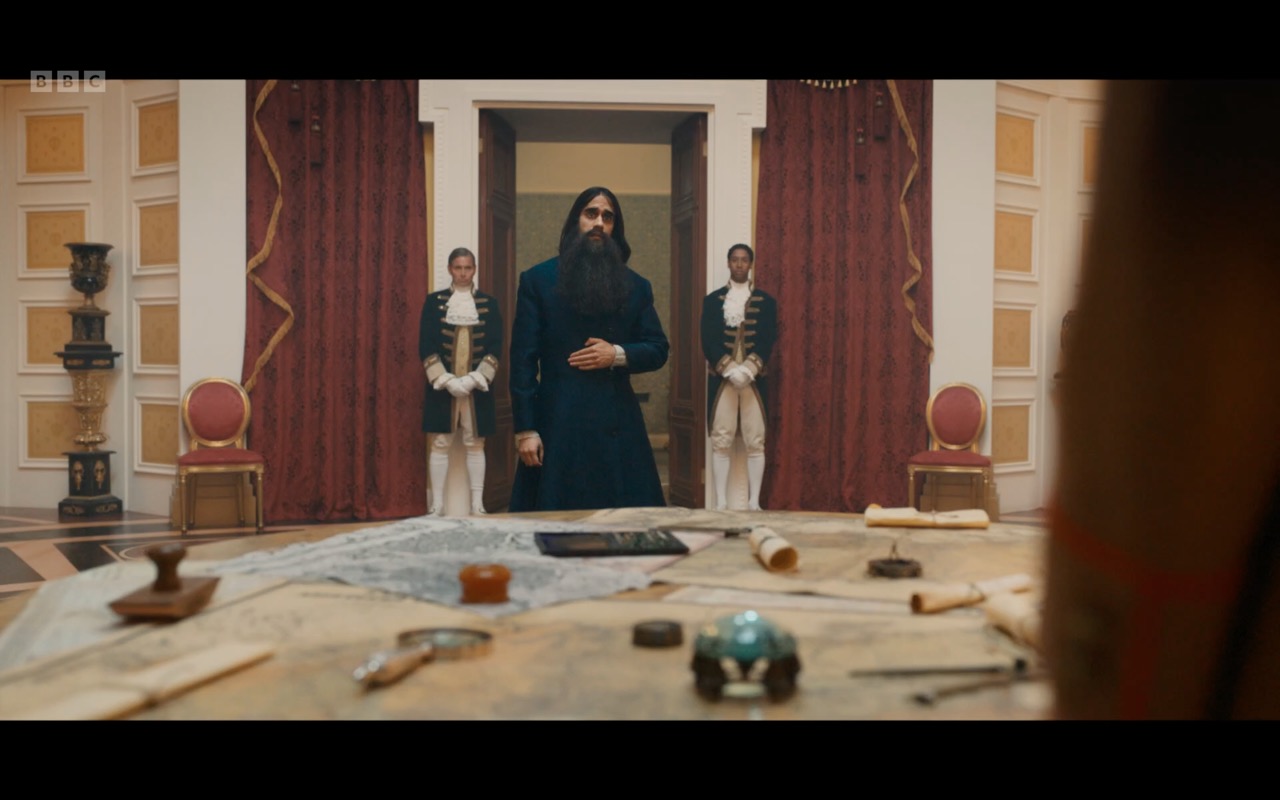
The Master (Dhawan), disguised as Rasputin for no discernible reason apart from wanting to “dress for the occasion” (a line lifted from the TV Movie), has created a new planet in the skies above St Petersburg, one powered by his own TARDIS, cyber-technology, and the sentient energy of a Qurunx kidnapped from the space train. In London, a mystery about 15 missing paintings draws in former companions Ace (Sophie Aldred) and Tegan (Fielding), keeping a watchful eye on strange goings-on in The Doctor’s absence. However, Tegan’s a bit slow on the uptake when she’s gifted a Cyberman ‘doll’ on her trip to the Carpathians while investigating a dozen vanished seismologists. Chibnall manages to deliver an emotional punch that subtly reflects Tegan’s backstory involving the Cybermen and her relationship with The Doctor, and it’s exploited to further effect later. This elaborate ruse perpetrated by The Master is part of his scheme to seize control of UNIT and capture The Doctor using the combined forces of the Cybermen and the Daleks, one confusingly referred to as ‘The Master’s Dalek Plan’, ‘’The Cyber-Dalek Master Plan’, or ‘The Cyber-Master’s Dalek Plan’ (did you see what he did there?)
But what, as The Doctor ponders, is all this for? Whereas in the TV Movie, The Master (then played by Eric Roberts) sets out to steal The Eighth Doctor’s (Paul McGann) remaining regenerations for himself as he turns Earth inside out with the Eye of Harmony on New Year’s Eve, the twist here is that Dhawan’s Master actually wants to swap identities with Whittaker’s Thirteenth Doctor so he can trash her reputation while his CyberMasters convert the human populace and Daleks apply tectonic pressure to Earth’s volcanoes (they’ve enjoyed drilling into the Earth’s core since their first attempt in 1964).
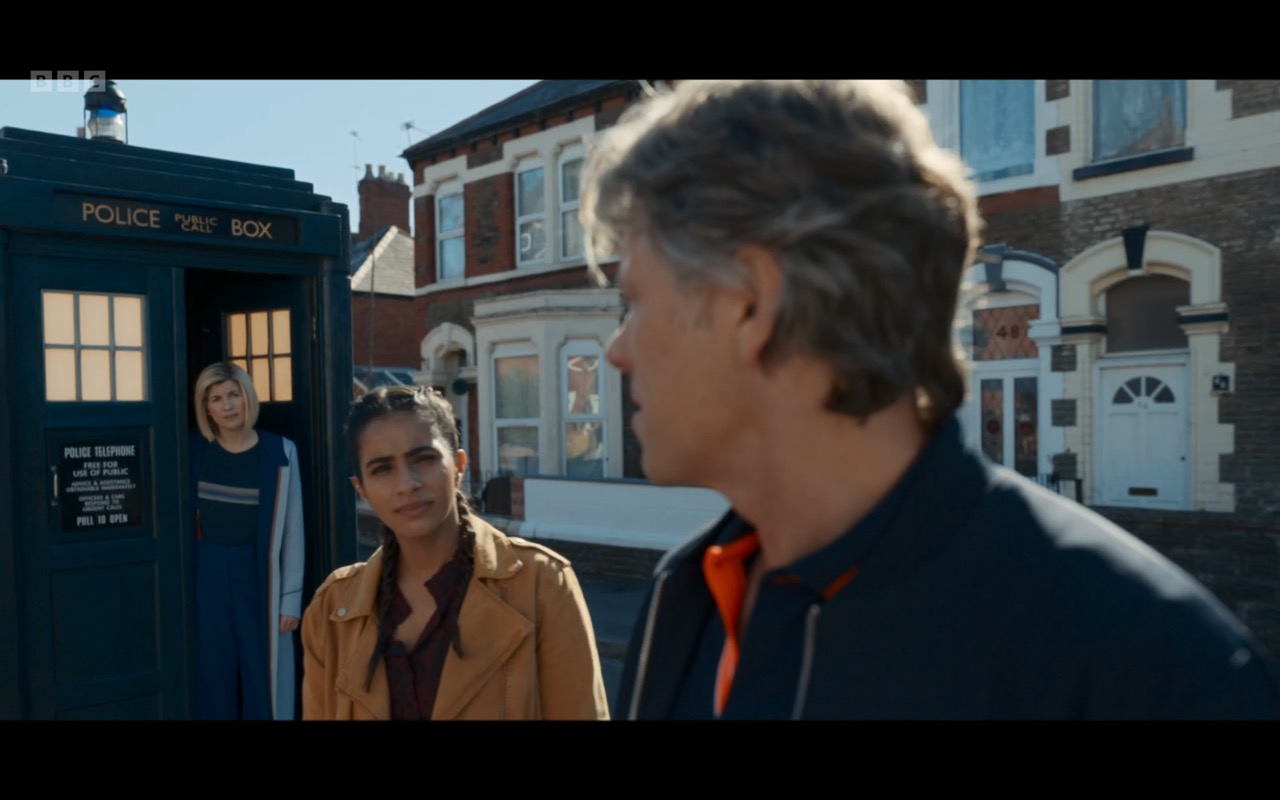
His separate Cybermen and Dalek incursions–evocative, well-designed and photographed as they are–become superfluous window dressing once their use as spectacle is exhausted. They’re not, after all, the scary threat of the story but provide action set pieces to give guest companions like Tegan, Ace, and even Graham (Bradley Walsh inexplicably turns up to fight Daleks in a volcano) more active roles, while a totally insane Master lures The Doctor to her death. They’re also a celebratory and nostalgic decoration to more resonant material that provides particular emotional heft to Janet Fielding and Sophie Aldred’s guest appearances.
Like many of the Doctors and companions of the 1980s appearing in this finale, I suspect Chibnall’s similar nostalgia for the 1970s was the inspiration for The Master’s take on Rasputin, emulating “Russia’s greatest love machine” through the dance moves of Boney M’s Bobby Farrell. Perhaps it’s a nod to John Simm’s similarly unhinged take on the Scissor Sisters’ “I Can’t Decide” in 2007’s “Last of the Time Lords”. A pity really, as an entire episode set at the court of St Petersburg with Rasputin manipulating the Imperial family would have been fascinating!
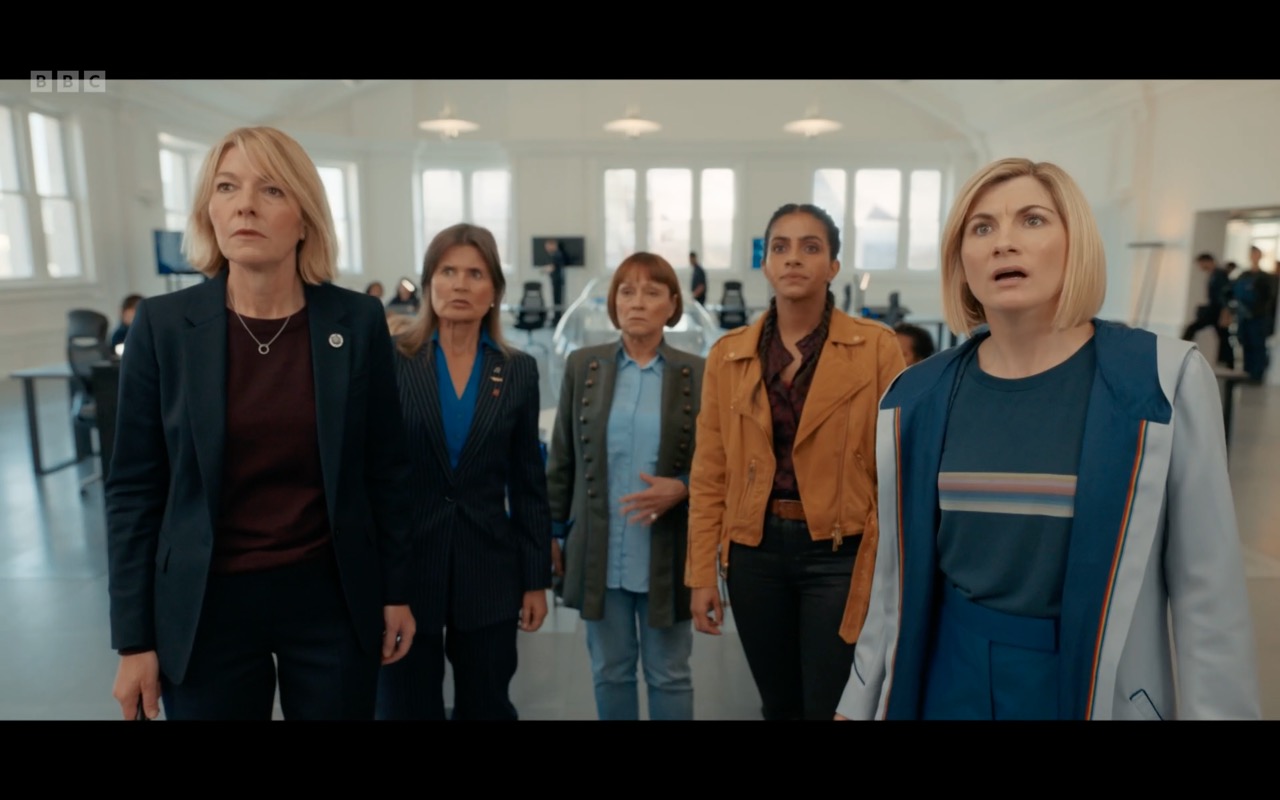
Similarly, The Master’s egotistic penchant for replicating his image, this time using the 15 famous paintings as his calling card, and the use of the forced regeneration chambers to take The Doctor’s identity harkens back to the Simm Master’s use of the Immortality Gate to create his humankind doppelgangers in 2009’s “The End of Time, Part One”. Indeed, “The End of Time, Part Two”, featuring Tennant’s departure and farewell to many of the era’s companions, could be seen as a template for “The Power of the Doctor”. Paintings were also the Zygons’ hiding place in the 50th-anniversary special “The Day of the Doctor” in 2013.
The initial encounter between The Doctor, Tegan, and Ace at Unit HQ elevates Chibnall’s script because it’s an emotional reckoning for all three, deftly and wittily exploring the psychological effect of The Doctor on human lives. With both women co-opted by UNIT as freelancers (a spin-off series demanding to be seen…), Ace is perhaps more forgiving of her “Professor” given Tegan’s still wrestling with 38 years of inner demons. Pointedly, Tegan bluntly informs Yaz (Gill), “we used to be you, decades ago.” The ‘doctored’ paintings may be a witty diversion from this lingering discomfort but they also prompt an invite to The Master’s keynote seismology conference address in Naples. There his sudden appearance is a reality check for Tegan and Ace, whose past fears have not entirely gone away.
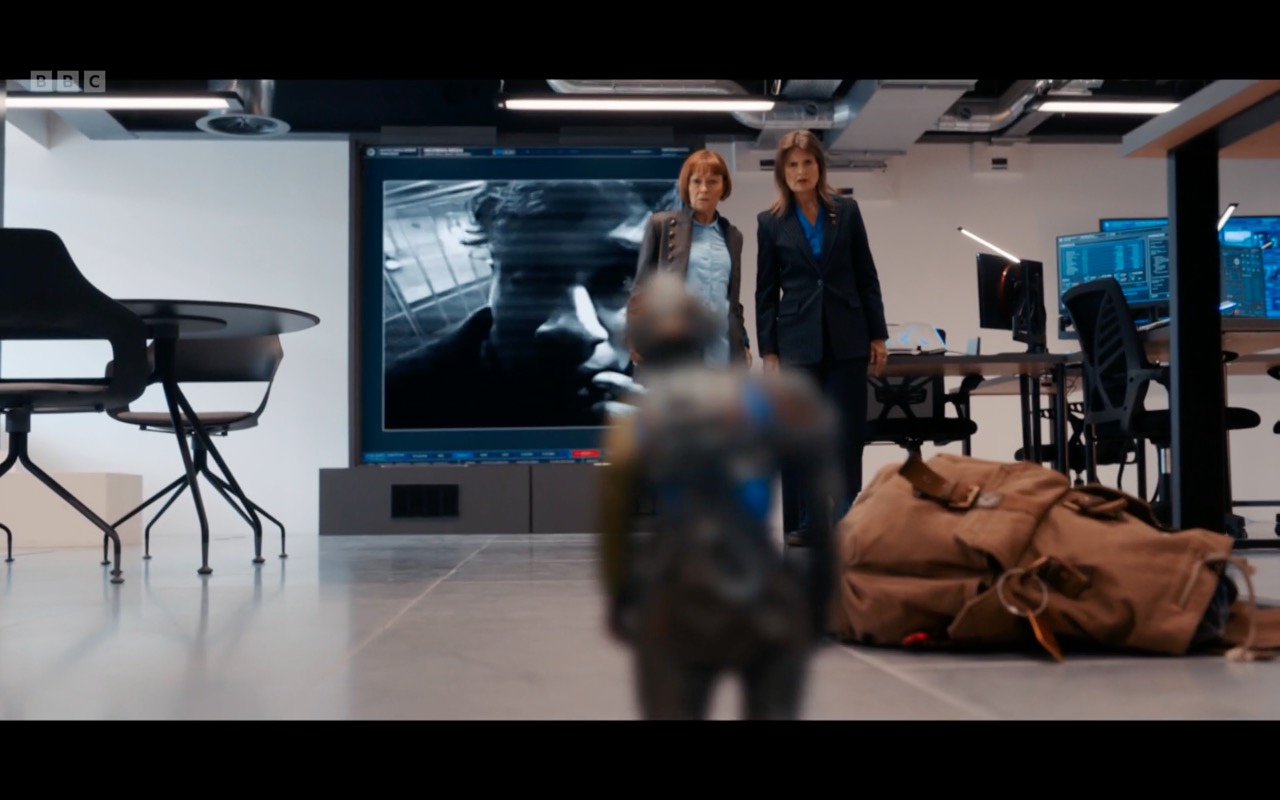
As UNIT arrives to arrest The Master, he “pinky-promisey” confirms The Doctor “will be erased from existence” by the time he’s finished with her. There’s an odd moment where The Doctor, in effect, actually arms Yaz with a gun to hold him prisoner as she brings him to UNIT’s London HQ. Although Yaz is a former police officer, the optics of The Doctor condoning a companion to bear arms sit so awkwardly that even The Master is taken aback! In the TARDIS, he’s at his most psychotic when he teases Yaz, boasting he’s many steps ahead of them because he’s using the Cyberium (the Cybermen’s A.I. knowledge of future history) to anticipate The Doctor’s moves.
The Master’s plan to take over her life and then spend it besmirching her triumphs, taking a leaf out of the Great Intelligence’s plan to rewrite The Doctor’s victories in 2013’s “The Name of The Doctor”, now hinges upon his incarceration at UNIT and the Cyberman ‘doll’ that Tegan stressed about earlier. Dhawan channels The Master’s cruel streak, telling Kate Stewart (Jemma Redgrave) that her beloved father was an idiot, reopening Tegan’s wounds about her Aunt Vanessa’s demise, and accusing The Doctor of ditching Ace. Ace’s traumatic relationship with The Doctor is mainly confined to Virgin’s New Adventures books, so The Master may well be referring to events in those publications, but Ace’s story has often been contradicted in other on and off-screen appearances and in the original plan for her departure from the classic series if it had continued beyond 1989.
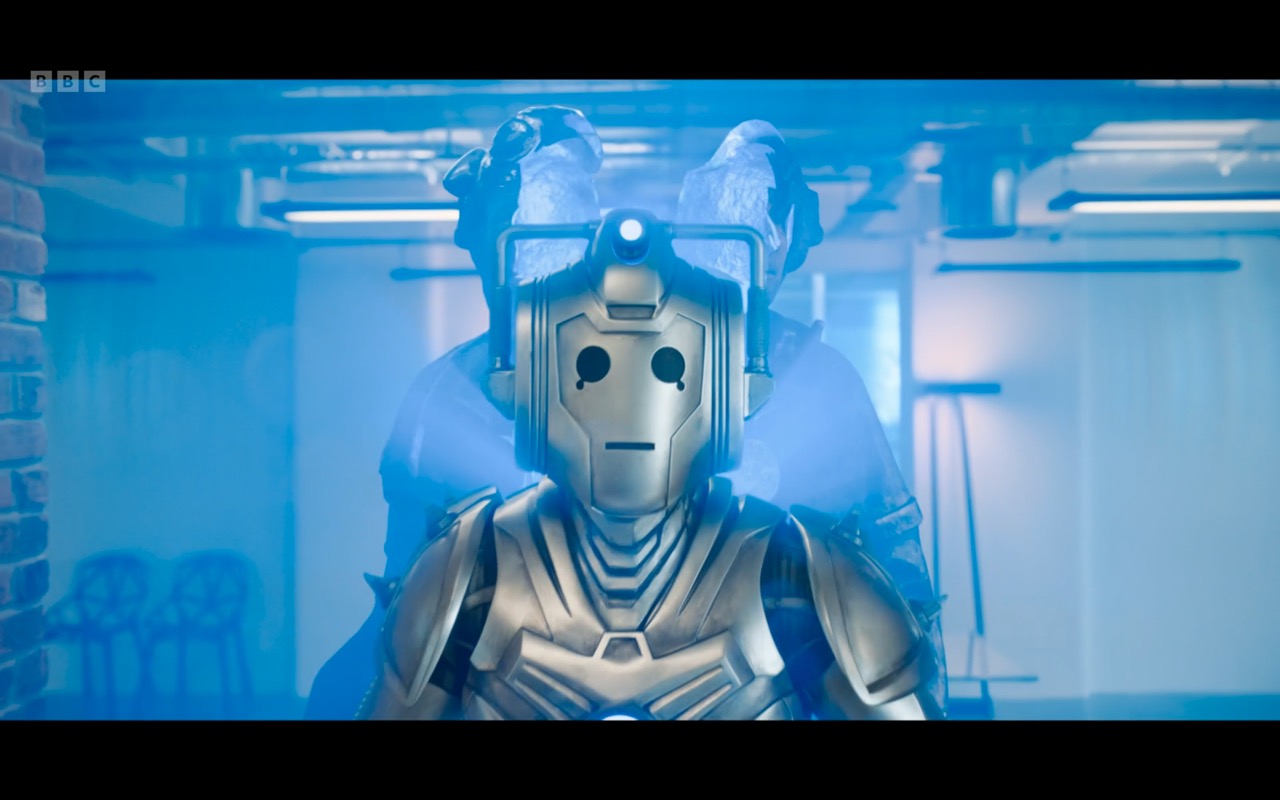
Tegan has inadvertently brought the ‘doll’ to UNIT HQ, and it regains its normal size as a cloned version of Ashad, the lone Cyberman from 2020’s “Ascension of the Cybermen”. Recalling the Genesis Ark that emptied masses of Daleks over Canary Wharf in 2006’s “Doomsday”, he splits open like a Russian doll to disgorge an army of Cybermen that lead an invasion and conversion programme. There’s no reason given how or why he can do this but, presumably, The Master devised the technique in order to smuggle the Cybermen into UNIT. In the general mayhem, it seems gold bullets have no effect on them when Ace and Tegan empty guns at the humourless “tin heads”. Once Ashad and the Cybermen fulfil their purpose, Chibnall gets back to a plot, often relying on a healthy dose of coincidence and convenience to push the story forward.
Away from this battle, The Doctor and Yaz go in search of the Daleks, following up on a message from a rogue Dalek informing them about an invasion of Earth. Meanwhile, Chibnall introduces another returning character, Inston-Vee Vinder (Jacob Anderson). He’s tracked the missing Qurunx to the Cyber planet orbiting the Earth in 1916. It seems an odd choice to bring him back when Chibnall quickly side-lined Dan, a warmer, more interesting, and relevant character given it’s the end of Whittaker’s time on the series.
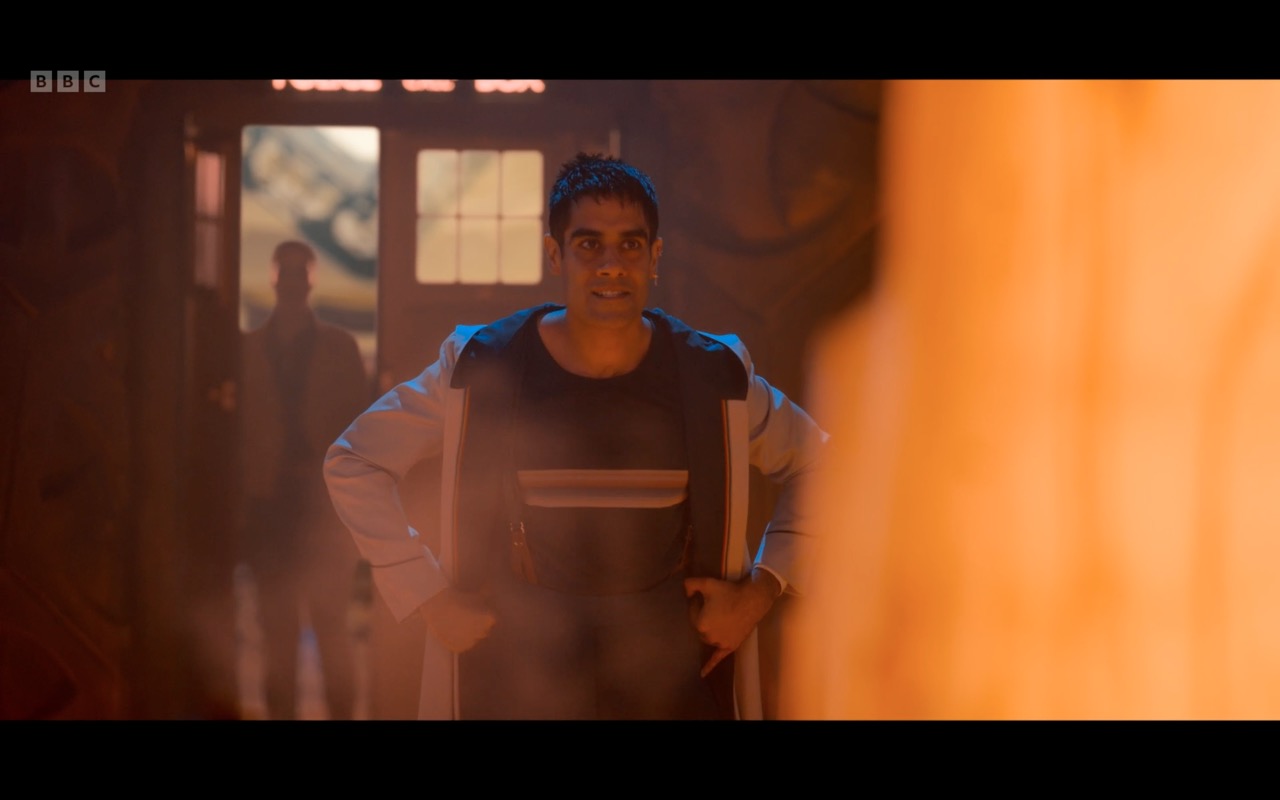
After much cross-cutting between subplots, the story settles on the manner of The Doctor’s demise. The Dalek’s message is yet another twist in The Master’s strategy, one engineered to capture and bring her to St Petersburg where he can gloat over his achievement to a gathering of his own “fam” that hate, rather than love, The Doctor. With great irony, he paraphrases Kennedy’s 1961 speech to the Canadian Parliament, where the President himself reasoned “what unites us is far greater than what divides us”, to mock The Doctor’s own reliance on community and team spirit, uttering a good man’s words with an evil tongue. He turns to the Time Lords’ sanction of forced regeneration, used to punish those who broke their laws, as a way to achieve his goal of becoming The Doctor.
Yaz confronts a Doctor wearing a face of evil but dressed in the familiar costume of her kind, compassionate friend. Looking for a companion to “bask in my brilliance”, he re-emerges as a mash-up Doctor-Master—all question mark jumper, long scarf, recorder and celery affectations—determined to force Yaz into travelling with him as the Earth becomes a Dalek foundry and home to cyber conversion. It’s a clever, complex idea exploring the outward appearance and inner nature of good and evil, represented by a searing, antagonistic confrontation in the TARDIS that shows Dhawan and Gill at their best. A war that’s symbolised by a moment when The Doctor-Master coldly observes two worlds bombing each other into submission. However, Yaz is having none of it and manages to steal the TARDIS.
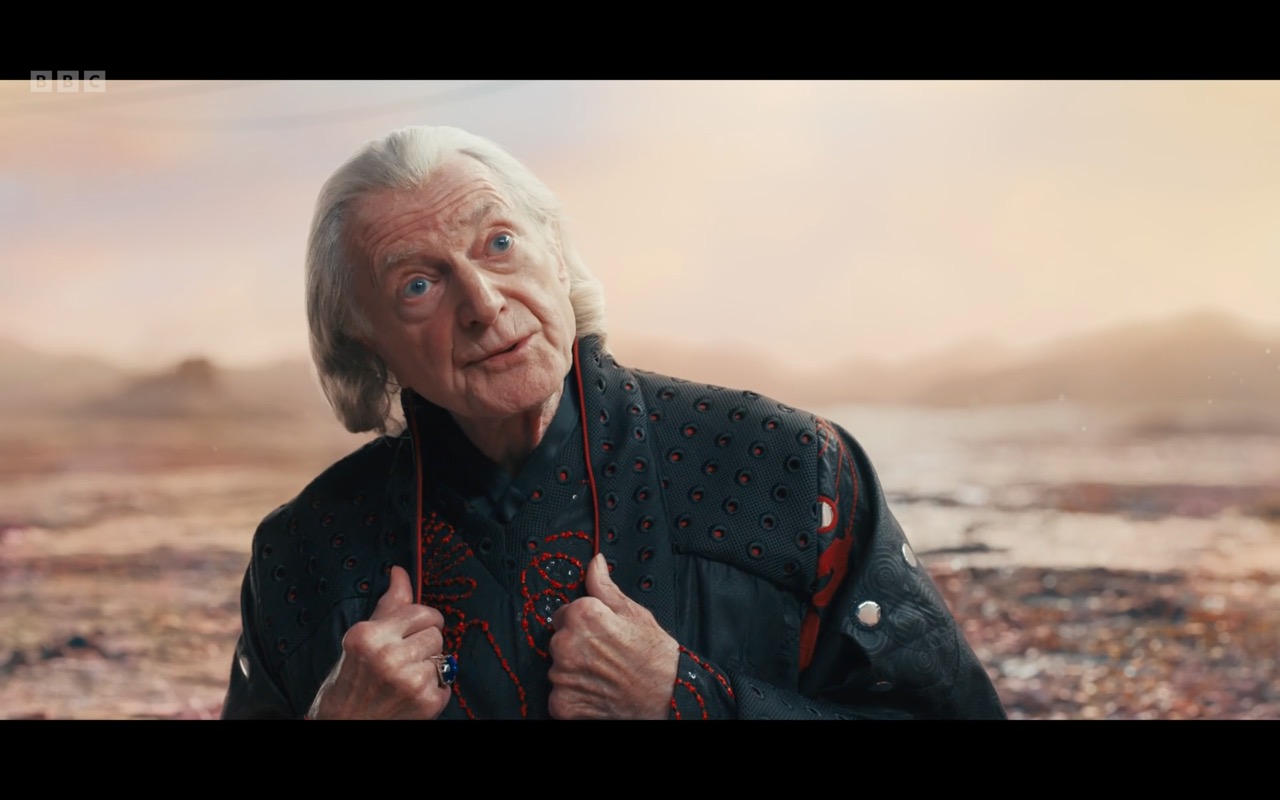
In something akin to the Christian concept of a soul that rejects the light of heaven, The Doctor meets her former incarnations at a crossroads on the edge of what might constitute a Time Lord afterlife. David Bradley, returning to the role of The First Doctor, suggests she’s a determined character if she’s not yet willing to pass through. The Sixth Doctor (Colin Baker) knowingly advises her that she must eventually cross over as it might “ruin it for the next one.” The Fifth and Eight Doctors (Peter Davison and Paul McGann) inform her that they’re the Guardians of the Edge, to prevent her from passing over because she/they still have unfinished business in the corporeal world. After Doctors Seven (Sylvester McCoy) and Eight amusingly bicker about wearing the appropriate robes, they all agree she has the advantage and must act while The Master is still vulnerable to post-regenerative weakness.
This sequence is perhaps the highlight of the whole script, quietly spiritual and contemplative, without cleaving to specific religious dogma, and suggesting that the free will allowing The Doctor to choose her own actions during her many lives might possibly extend to saving her soul on the edge of existence. How this then channels through an A.I. hologram of The Doctor, programmed with the data of her past experiences and lives, is somewhat glossed over with an explanation for the bursts of static electricity she inflicted upon her companions earlier in the story. Literally, the data ghosts of The Doctor take stock of the past and galvanise the companions into action.
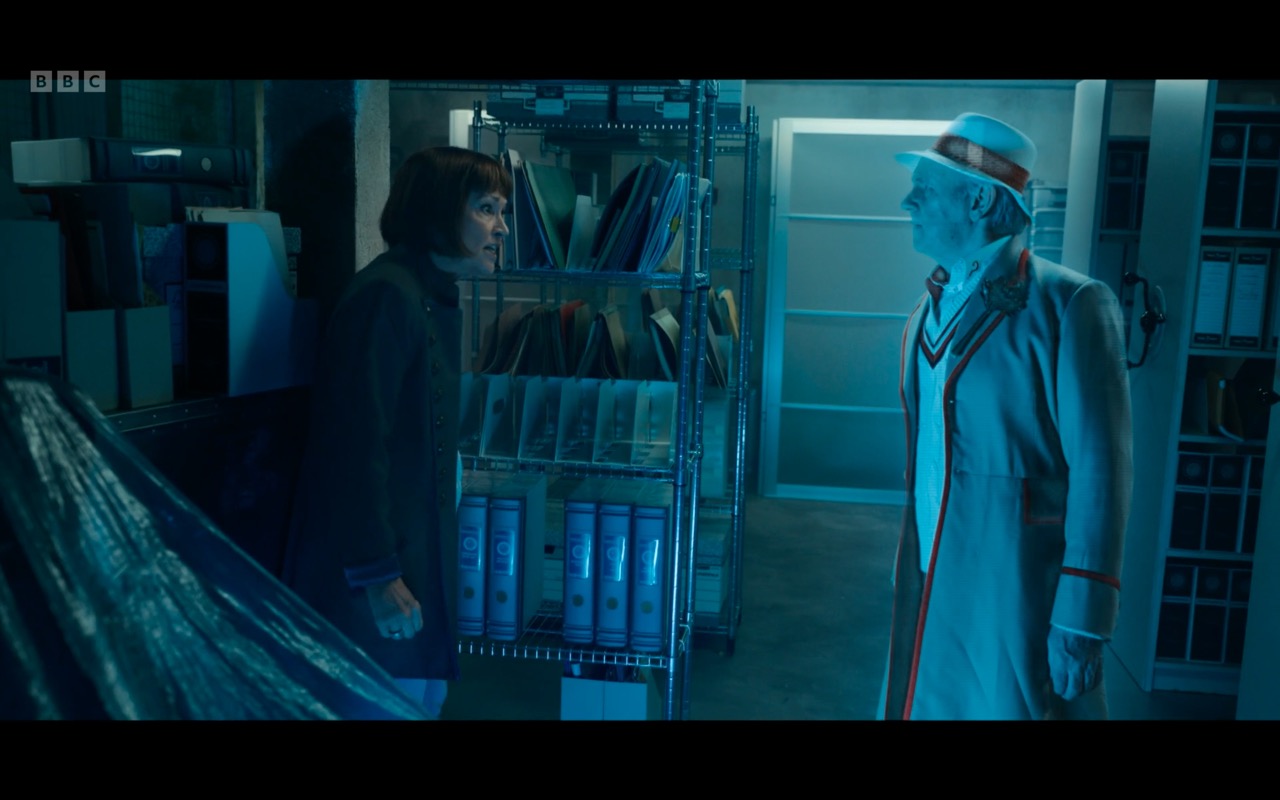
The episode’s last half hour effectively draws what has gone before to a conclusion and, most importantly, ends with a heartfelt farewell from Jodie Whittaker’s Doctor. Before the A.I. hologram Doctor saves the day, the story concentrates on the three women who, in the end, along with Jodie, make this an exceptional experience. Yaz, now a Doctor-like figure with Vinder to assist her, determines to hoodwink The Master and reverse the forced regeneration, while Tegan fights the Cybermen in their bid to convert Kate Stewart, as finally Ace leaps off a very tall building and dives spectacularly into a conveniently parked TARDIS in a sequence really worthy of a round of applause. Janet Fielding’s costume, a military-style jacket, suggests a defensive woman who has inadvertently found herself in a war zone, whereas Ace returns to the teenage bravado of her classic bomber jacket, baseball bat and cans of Nitro-9 (souped up to Nitro-999, of course).
While Tegan and Ace’s presence does push the nostalgia buttons to great satisfaction, The Master’s already indicated they’re still living with the aftermath of trauma. In their darkest hours, Chibnall sensitively reunites them with their respective Doctors, through the A.I. hologram, to address these injuries. Fielding’s exchange with Davison jumps from wit (about their relative ages) to pathos as Tegan and her Doctor address a mutual sense of loss and, poignantly, when faced again with the Cybermen, their memories of Adric. “Brave heart!” Similarly, Aldred and McCoy pause to consider the ethics of blowing things up. Ace’s Doctor concludes that, given an appropriate warning, “sometimes, sadly, it’s the only solution.” It’s an interesting reflection on the idea that The Doctor does weaponise his companions and, morally, it’s still a grey area. He believes he failed to instil a moral compass within the teenage Ace, but she demonstrates how she has since become a better person and regrets that their relationship deteriorated. McCoy’s Doctor reflects on the themes of leaving or returning home that Jodie’s Doctor highlighted at the start of the episode when she took Dan back to Liverpool. All companions must leave, but the joy will always come from “seeing them fly” without the safety net of their friendship with The Doctor. Ace!
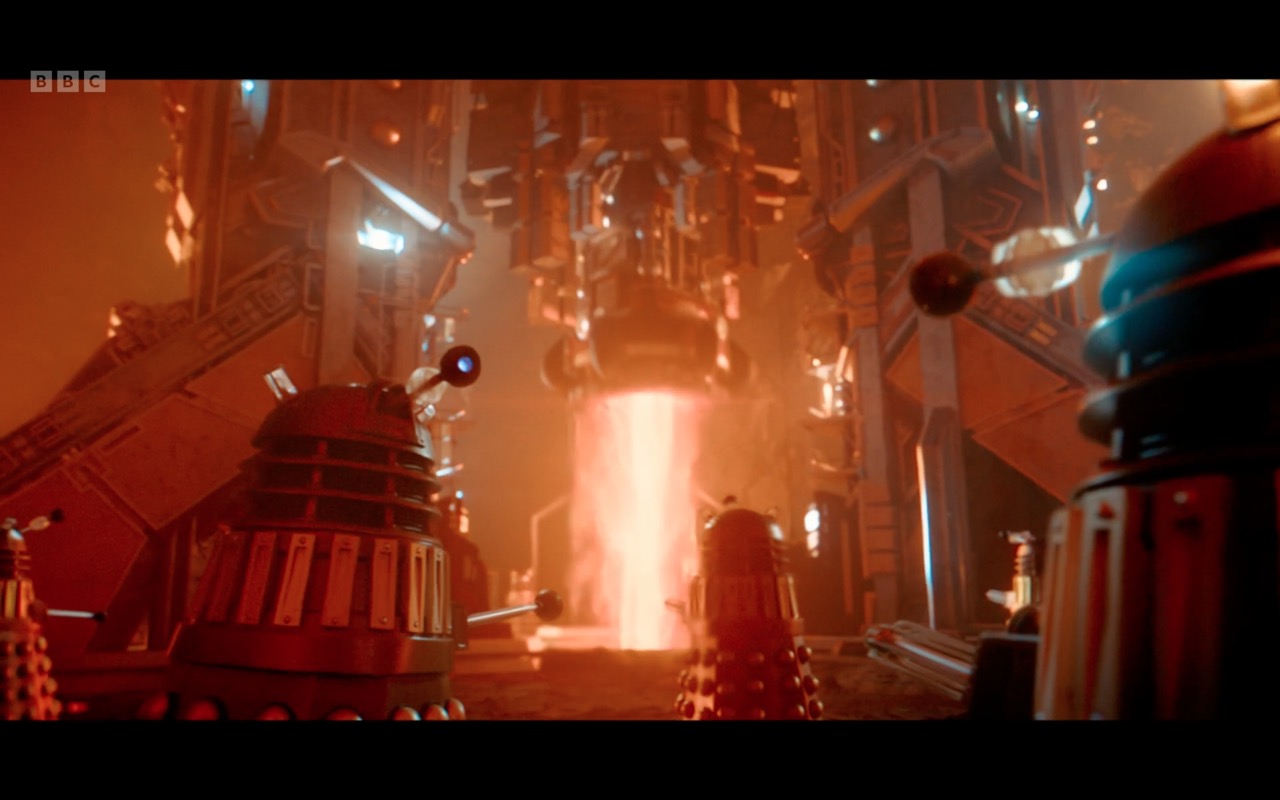
While the sudden appearance of Graham with Ace is one of Chibnall’s convenient moments, it’s an amusing scene of mutual perplexity over Graham’s use of the psychic paper before they determine to take out the Daleks and prevent the volcanic activity about to devastate the planet. Meanwhile, Yaz manages to pull the rug from under The Doctor-Master who, while taunting her abilities as a companion, is taken by surprise when she summons The Fugitive Doctor’s data ghost. His thoroughly stupid “fam” of Cybermen wipe each other out in a crossfire, leaving Jo Martin’s Doctor to suggest The Doctor-Master should have given them some brains. She triumphantly observes that, in making such schoolboy errors, he’s lived up to his Time Lord Academy reputation as “a rubbish schoolboy too.” The Doctor-Master is left abject, friendless and at the mercy of Yaz and Vinder, the companions “taught never to give up” and who now order him into the forced regeneration chamber to reverse the process using the regenerative energy of the CyberMasters. A restored Doctor, wondering what the heck she’s wearing, immediately attempts to resolve the problems of the Cyber planet in 1916 and the Dalek-activated volcanoes in the present day.
Tegan fries the Cybermen and saves Kate, destroying UNIT HQ in the process, and Ace and Graham take out the Daleks. Mopping up, The Doctor repairs Vinder’s ship and he travels safely back home. Having collected together all her true friends, we’re treated to a recap of 2008’s “Journey’s End” finale. There, all his companions gathered around the TARDIS console to help steer the hijacked Earth back to its rightful place in the solar system. Likewise Ace, Tegan, Graham, Yaz and Kate, full of unanswered questions, take up similar positions to help harness the power of two TARDISes and move the Cyber planet to the present day. The Doctor uses it to freeze the exploding volcanoes and turn them “into public art” and requests the freed Qurunx to destroy the Cyber planet. All in a day’s work, but she’s been a bit cocky and her old friend The Master, his body failing, has popped back to his TARDIS with murder on his mind. In his final act, directing the Qurunx to kill her, he declares, “if I can’t be The Doctor then neither can you.”
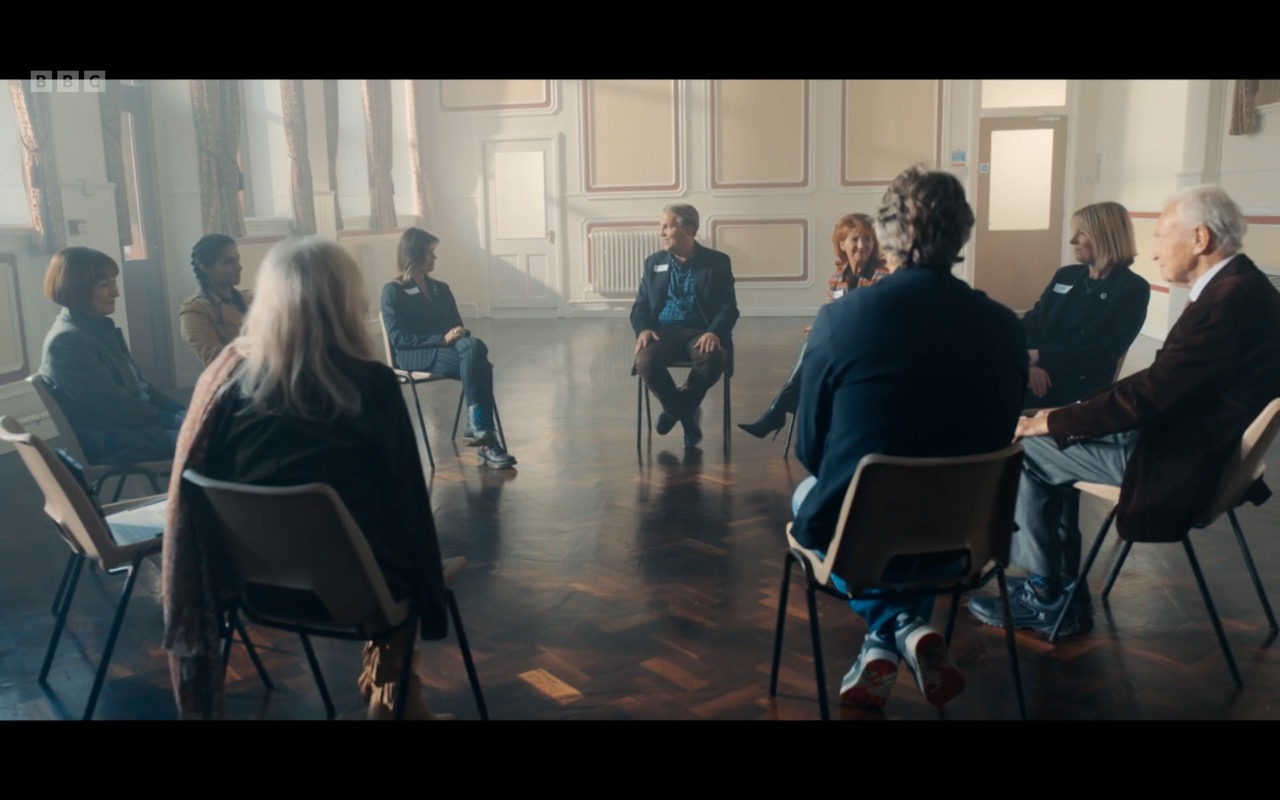
However, The Doctor seems to recover after all her friends have been dropped off in Croydon (appropriate since The Fourth Doctor said farewell to Sarah Jane Smith there in 1976’s “The Hand of Fear”). However, the regeneration process has started and, knowing she has time left for one last trip, she spends her final hours with Yaz, sitting on the TARDIS roof, eating ice cream high above the Earth. It’s a lovely, quiet, tender, emotional scene, with Whittaker and Gill playing it for all its worth. It properly consolidates the growth and importance of their relationship across Whittaker’s tenure, especially now that “goodbyes only hurt because what came before was so special.” While it is time for The Doctor to go, Yaz will be cared for by The Doctor’s friends back on Earth, a sort of ‘companions anonymous’ where stories can be exchanged with Ian Chesterton (97-year-old William Russell returning as one of the First Doctor’s original companions), Mel Bush (Bonnie Langford), Jo Grant (Katy Manning), Tegan Jovanka, Kate Stewart, Ace, Graham and Dan. It’s not goodbye if they share all their life experiences. The Doctor lives out her dying hours by following writer Dennis Potter’s mantra, from his last TV interview in 1994. Dying from cancer and observing the trees from his window, he accepted life and death on his own terms, by finding glory in “the whitest, frothiest, blossomest blossom that there ever could be.”
Perhaps in a little in-joke concocted by Chibnall and a certain Russell T. Davies, Whittaker seems to come full circle by turning up in Broadchurch, judging by the cliffs and the sea in the background. Then, suddenly, it’s “tag, you’re it…” and The Doctor’s David Tennant… again! Apparently, he’s officially The Fourteenth Doctor. We’ll have to see how that and Ncuti Gatwa’s arrival as The Fifteenth works out in 2023 but it’s fair to say that, in “The Power of The Doctor”, Chibnall succeeds in finding an exciting, nostalgic, celebratory and heartfelt way to close his era.
UK | 2022 | 90 MINUTES | 16:9 | COLOUR | ENGLISH

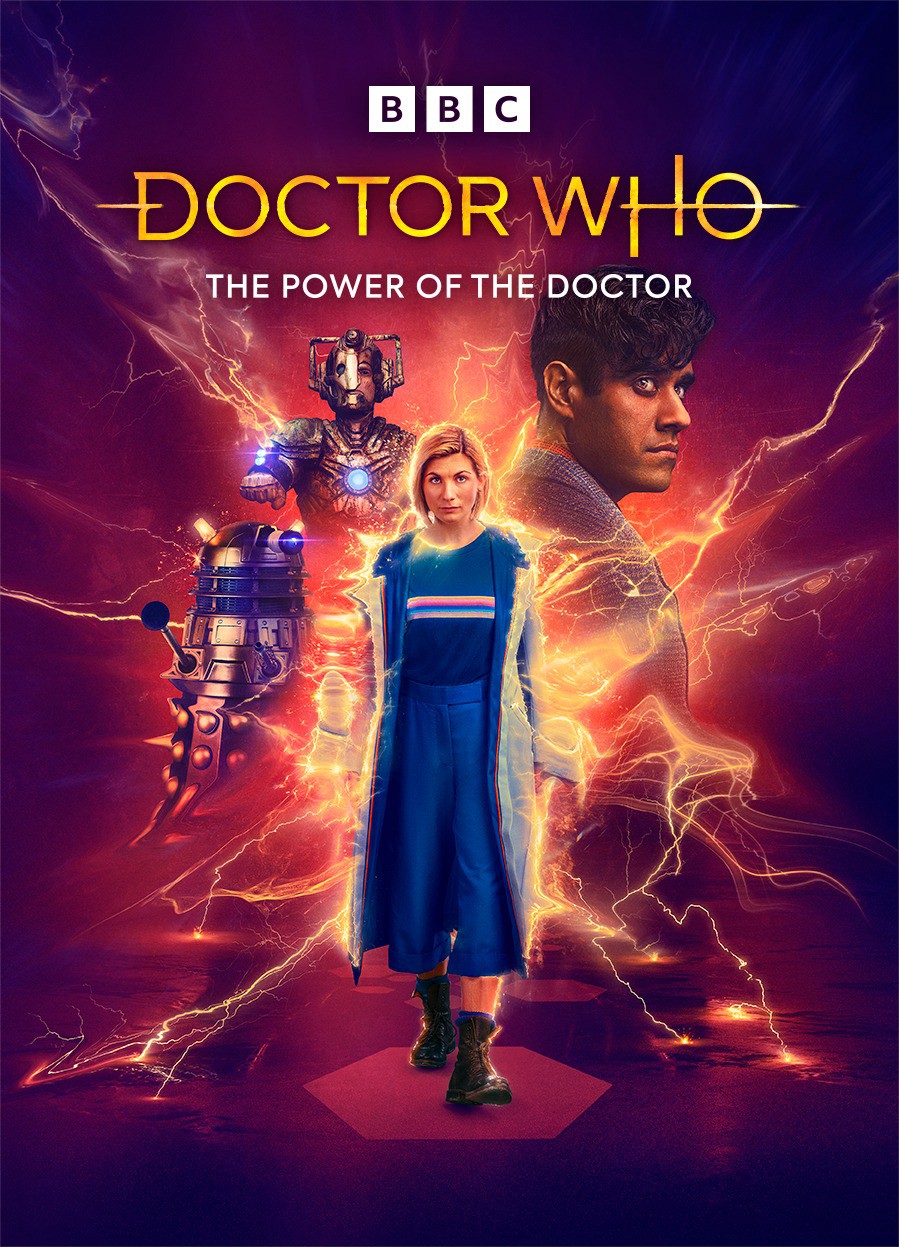
writer: Chris Chibnall.
director: Jamie Magnus Stone.
starring: Jodie Whittaker, Mandip Gill, Sacha Dhawan, John Bishop, Sophie Aldred, Janet Fielding, Jo Martin, Jemma Redgrave, Jacob Anderson, Bradley Walsh, David Bradley, Colin Baker, Peter Davison, Sylvester McCoy & David Tennant.
